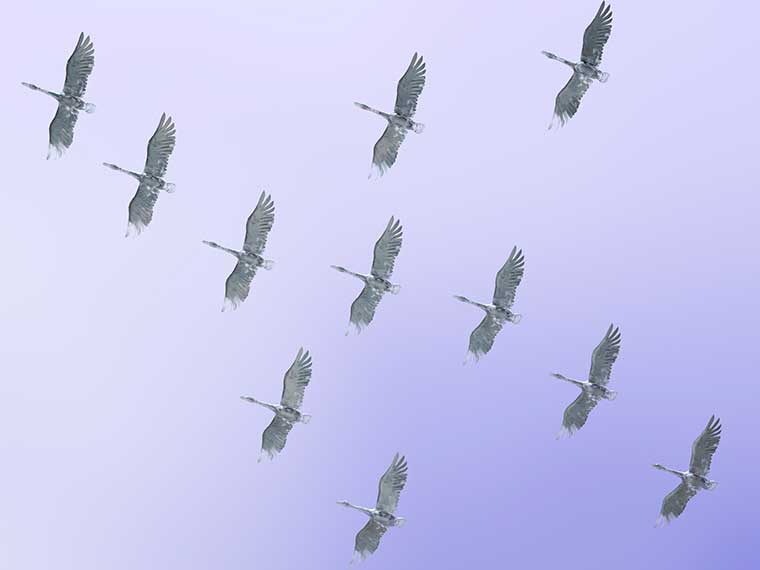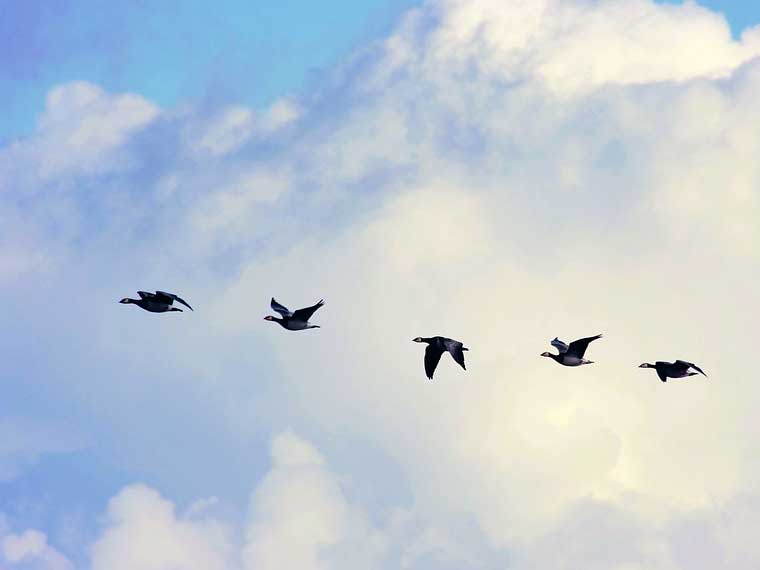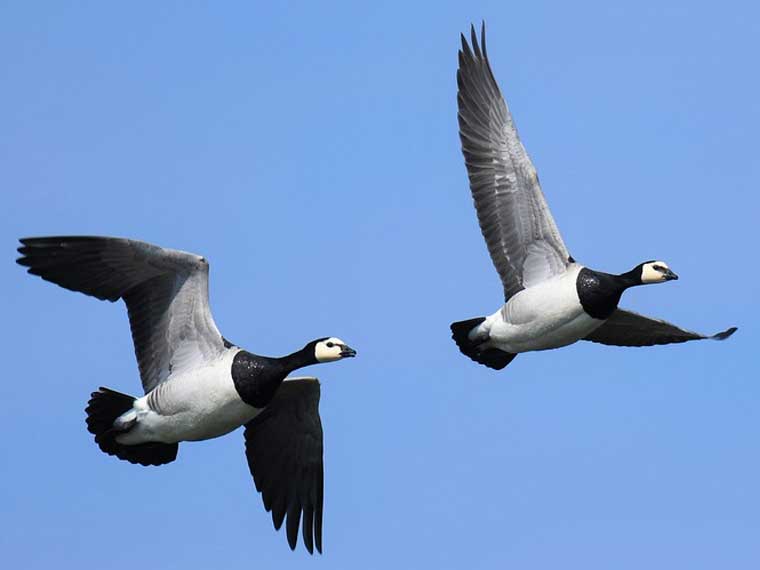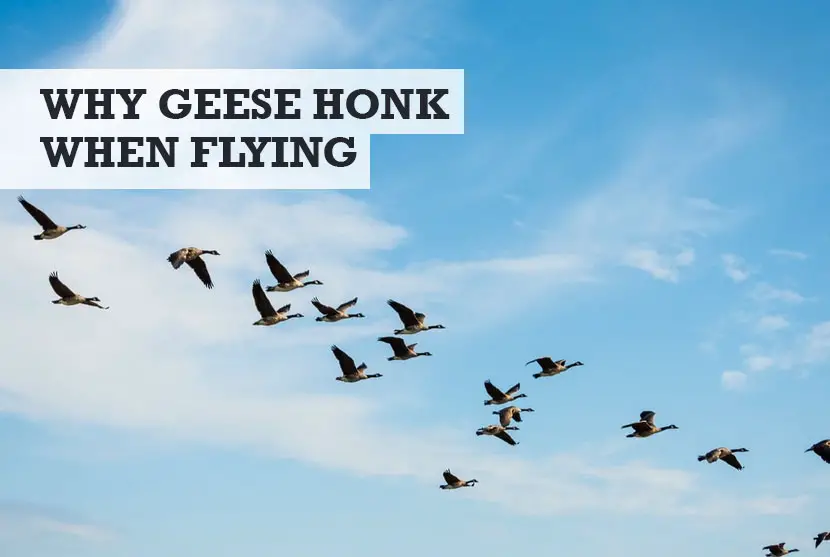Formations of geese flying and honking overhead are often the first sign of the changing of the seasons. Heading north in the spring and south in autumn, wild geese are a familiar sight. The flock is often heard long before it’s seen.
Their loud and continuous honking when flying in formation certainly demands our attention. Ever wondered what are geese saying when they fly though? Here’s what all that flying and honking means, with the short answer first.
Why do geese honk when flying? When geese honk during flying in formation, they are communicating with each other. Scientific research indicates that their honking has 3 main purposes: communications, flock maintenance, and team encouragement.
Intuitively, you probably knew that they are communicating, but what do all the geese noises really mean? Read more below, it’s fascinating!
Why do geese honk when flying in formation?
The reasons why geese always honk when flying is primarily down to them communicating changing conditions to other flock members. A change in honking can indicate a food source, like a pond or large lawn.

For example, let’s say the goose are flying over a piece of land. We know they like to eat grasses and aquatic plants. When one goose sees this food source, the honking and flying might start.
It’s the job of all members of the flock look for changes in the landscape and new opportunities. Flock members also keep an eye on each other and will communicate a need for assistance by honking when flying in formation.
Also, if a goose drops out of formation due to illness or injury, 2 other birds will also drop from formation to assist. That information is communicated to the lead birds through honking during flight.
Geese honking when flying in formation helps keep the flock together
Flock formation is extremely important to migrating geese. Maintaining a tight formation can reduce the effort needed for flight significantly.
One study by the Audubon Society found that birds flying in a tight formation flapped their wings 80 percent less! Geese maintain their tight formations by communicating continuously. That continuous honking tells leading birds where the rest of the flock is exactly.
The most interesting reason why geese honk when flying is to do with team encouragement. They are honking more than their location. They are actually honking encouragement to the lead birds, reminding them that they are part of a strong team with united goals.
Migrating geese function as a team. They often shift leaders to share the load of leadership. Their team management approach allows flocks to migrate as much as 5000 miles. Perhaps humans could learn from this awesome example!

Why do geese honk before they fly?
As well as honking during flight, geese will also honk a lot before they fly. This possibly due to them getting the flock read for the flight, the excitement that awaits, and warnings of the impending migration.
What do geese noises mean aside from honking?
Honking is the primary sound that geese make. They use that sound to communicate more than flight information. They can locate another family member in a large flock by honking, as each bird has a unique tone and timbre.
Geese also communicate essential information, like the presence of a predator, by honking. Scientists are beginning to translate these honks, and are finding surprising nuances in the communications of geese.
The other primary sound made by geese is hissing. Anyone who has been hissed at by an aggressive goose will remember how threatening the encounter can be. Geese are often aggressive when faced with a threat, especially if they have nesting young.
Both male and female guard the nest, so often 2 angry geese will inform a trespasser of their error.
Geese will even hiss when a human tries to feed them, such is the threat they feel at this point. When confronted with aggressive geese, the wisest course is to back away slowly, while maintaining eye contact.
Why do geese honk at night?
If it seems that more geese fly overhead honking loudly at night than during the day, you are correct. Lower temperatures at night reduce air pressure and reduce the effort needed to fly.
Since geese are able to navigate easily in the dark, night-time is a preferable time to travel – when they are not sleeping of course. The honking ensures that the flock stays together at night, as well as encouraging the current lead.
How do geese decide who flies in front?
Aside from hearing geese honking whilst they fly, you might also wonder how they decide who flies at the front and top of the formation.
Well, I believe it’s quite simple.
Geese have a very democratic society as every member of the flock takes a turn at being the lead bird. Research found that the lead bird will expend nearly 5 times as much energy as the birds following behind.
Each bird will take the lead for a time, expending significant energy for the benefit of the flock, while other geese encourage the leader by honking loudly.
As the lead bird tires, another bird will volunteer to be the lead by overtaking the leader and settling into the lead position. The former leader then relaxes in a position further back.
OK, so that’s what I discovered about the reasons why geese honk when flying. But to understand them a little better, check this out…
Types of geese
Geese are common throughout the Americas, Europe, Asia, and Africa. Geese breeds divide into 2 major categories: wild and domestic. Geese are a subgroup of waterfowl, so are closely related to ducks and swans, with a size midway between the two.
Geese have been domesticated all over the world, resulting in 27 distinct recognized breeds. Each were developed to meet specific needs and conditions. Breeds developed in colder countries, for example, tend to be heavier-bodied than breeds from warmer climates.

The first duck species are thought to have been developed in Egypt more than 3000 years ago. Experts in bird management note that geese are an underdeveloped resource.
They are produced commercially in only a few countries, yet are adaptable and easy to care for. If you want to know more, I can recommend domesticforest.com/geese for more information about domesticated varieties.
Wild geese are also found worldwide. Many wild breeds migrate south for the winter, flying as far as 5000 miles, to raise their chicks in a friendlier climate. Some birds choose not to migrate, especially when living in an area with an abundant food supply.
Canadian geese, for example, increasingly reside in urban areas with steady food sources like parks and lakes.
More and more of these birds chose not to migrate. If the parent birds do not migrate, their chicks never learn the route, so they will never migrate.
The year-round presence of these large birds is creating conflict with humans wishing to use urban green spaces.
Handy Hint: Geese will fly in most weathers, but might draw a line in heavy rain like this.
Where can I go to see and hear wild geese migrating?
The sound of honking and the sight of large V formations overhead is a memory that can last a lifetime! Migrations can be seen in many locations during spring and fall.
Tours to see the migration and learn more about geese are available throughout Europe and North America. Skagit Valley organization in Washington state offers an excellent example.
More information at Skagit Valley Snow Geese Eco Tour – Visit Skagit Valley – North Cascades National Park to Farmlands to Salish Sea
How can I prevent migrating geese from taking over my lawn?
Large passing flocks of geese can contain tens to hundreds of individuals. That many large birds, eating the lawn and deficating, can create a nuisance quickly. If the flock chooses to settle permanently, they can create a major disruption.
With an increasing population of Canadian Geese, problems between people and geese are occurring more frequently.
Washington’s Department of Fish and Wildlife offer numerous suggestions on how to deter geese, including scarecrows, noisemakers, and even dogs. Most effective, however, is replacing lawn with garden
Conclusion
The next time you hear geese honking when flying in formation, you can now tell your friends just why they do it. If you are interested in strange facts about geese, read on below.
You might also like…
- The mystery finally solved about geese pooping during flight
- Is it possible for geese to kill a human being?
- Why geese are seen standing on just one leg
Image in header via https://unsplash.com/photos/J54DjpXYJuE


